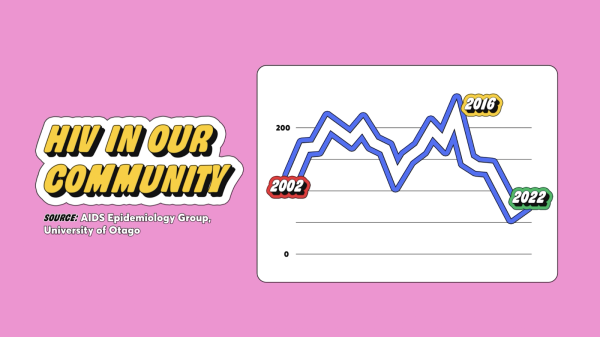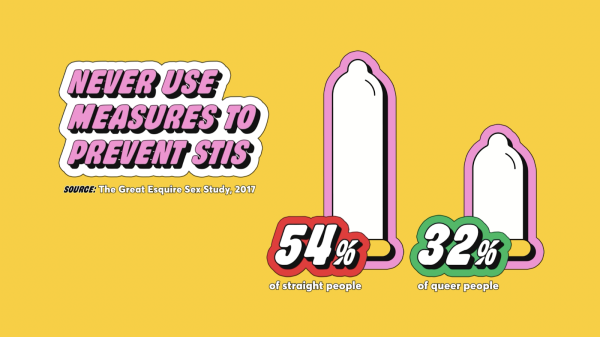For the most part, queer people are really good at taking care of their sexual health – and it’s about time we celebrated that.
And it’s time to end the misconception that queer people are promiscuous, sexually irresponsible or unsafe with their sexual practices, says Josh McCormack, project lead of Sex Outside the City.
In a US study published only two years ago, gay men were more likely to be stereotyped as being associated with promiscuity and STIs more than straight men/women.
Josh says once a queer person becomes engaged with their community, they are slammed with sexual health messaging.
“We see it on the ads in our dating apps, we see it in our networks on social media. Name one gay bar that doesn't have posters up about PrEP or condoms, or have free condoms in the bathrooms.
“We are constantly being bombarded with safe sex education.”
But when it comes to straight people, it’s a different story.
Mainstream society tends to treat sex as taboo. And as a result, topics such as sexual health and STIs are often not talked about.
There are a number of different reasons why queer people seem to be more on top of their sexual health than straight people.
This is a supplementary article to our docuseries Queer Academy, made with the support of NZ On Air. You can watch the full series on YouTube here.
1. The AIDS crisis
“Queer people are good at sexual health because for a lot of us, we were forced to in the ’80s,” says Joe Rich, chief executive of the Burnett Foundation Aotearoa, formerly known as the New Zealand AIDS Foundation.
“It was life or death in the AIDS crisis.”
In the 1980s, the HIV/AIDS crisis began to rapidly affect men who have sex with men in developed nations. The disease has since killed roughly 40 million people globally.
“[The queer community] had to learn very quickly how to mobilise, how to understand what was going on and change our behaviour to save ourselves,” Joe says.
“We unshackled what, I guess, a lot of people have, which is a fear of talking about sex publicly.”
Joe says that this gives the queer community an advantage, as they are now able to talk about aspects of sexual health more comfortably than mainstream society.
2. We’ve seen a decrease in HIV transmission in Aotearoa
In 2021, the number of people first diagnosed with HIV was the lowest it had been in 20 years. Additionally, the number of diagnoses that year was a 50% reduction since 2016.

And in 2022, the Government invested $18 million towards a plan that aims to eliminate HIV transmission in Aotearoa by 2032.
Joe says that the decrease in HIV transmission is testament to the queer community engaging in behaviour that protects them and others in the community from HIV transmission.
This includes condom use, PrEP and higher rates of testing.
“All of those things combined have had a real and noticeable impact on HIV transmission in New Zealand.”
3. Increase in STI testing and HIV prevention tools
In 2018, PrEP became publicly funded in Aotearoa.
It’s a pill that people who don’t have HIV can take to prevent them from contracting the infection.
PrEP works so well that Dr Mark Thomas, an infectious diseases expert, says the drug is “way more effective than condoms” at preventing HIV transmission.
Additionally, in order to access repeat prescriptions of PrEP, patients need to get a full STI checkup every three months.
So as a result of using PrEP, queer people have become engaged and proactive in getting regular checkups for HIV and other STIs.
4. Queer people are more likely to take measures to prevent STIs
There’s no New Zealand-based data that directly compares the sexual health habits of queer and straight people.
However, a US-based survey found that 54% of straight people never use measures to prevent STIs, compared to 32% of queer people.

“It’s time we ended the misconception that queer people are sexually irresponsible,” says Josh McCormack, Co-Founder of Collective for Rainbow-Affirming Visibility and Equity (C.R.A.V.E).
Josh says once a queer person becomes engaged with their community, they are constantly being bombarded with safe sex education.
“Name one gay bar that doesn't have posters up about PrEP or condoms, or have free condoms in the bathrooms.”
But when it comes to straight people, it’s a different story. Topics such as sexual health are often not talked about in mainstream society.
There are a number of different reasons why queer people seem to be more on top of their sexual health than straight people.
Read more stories from Queer Academy below: